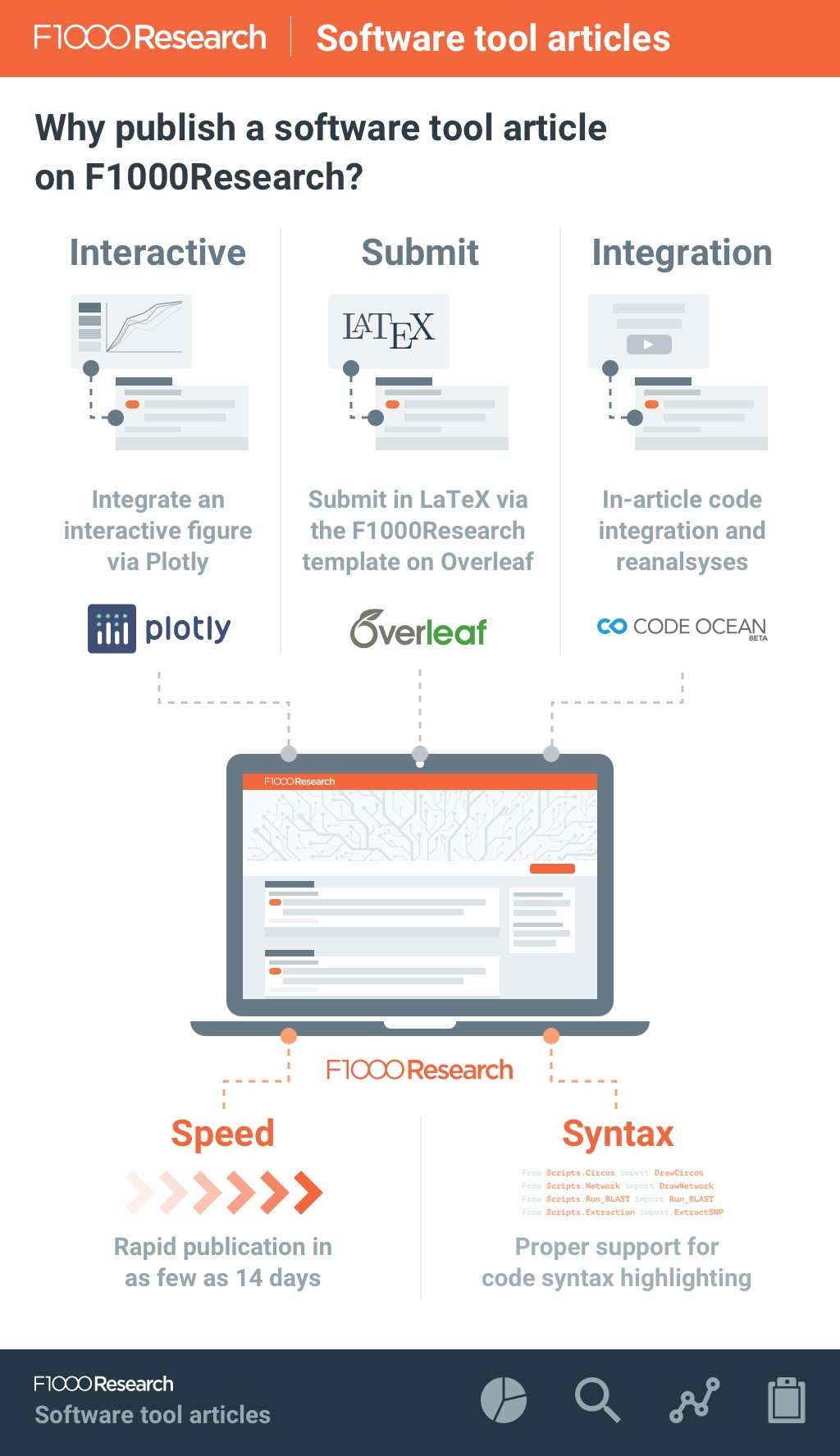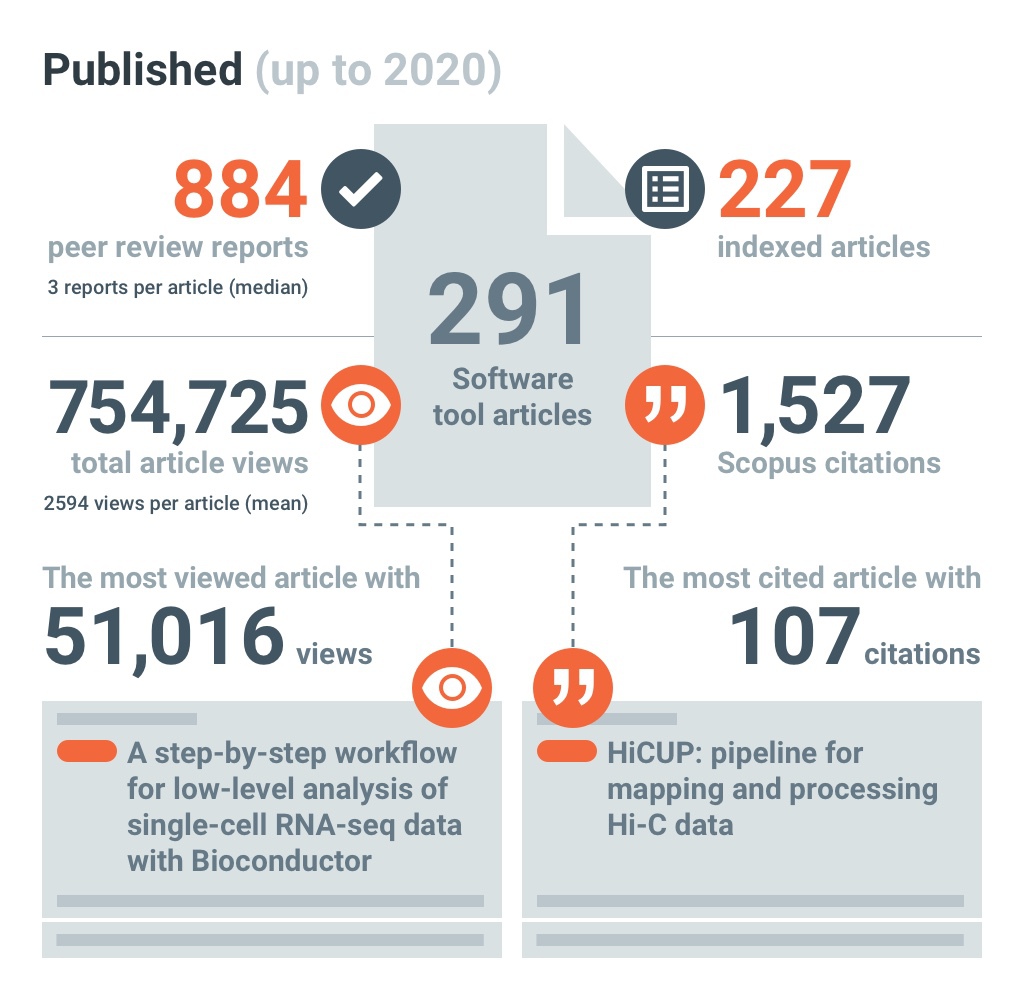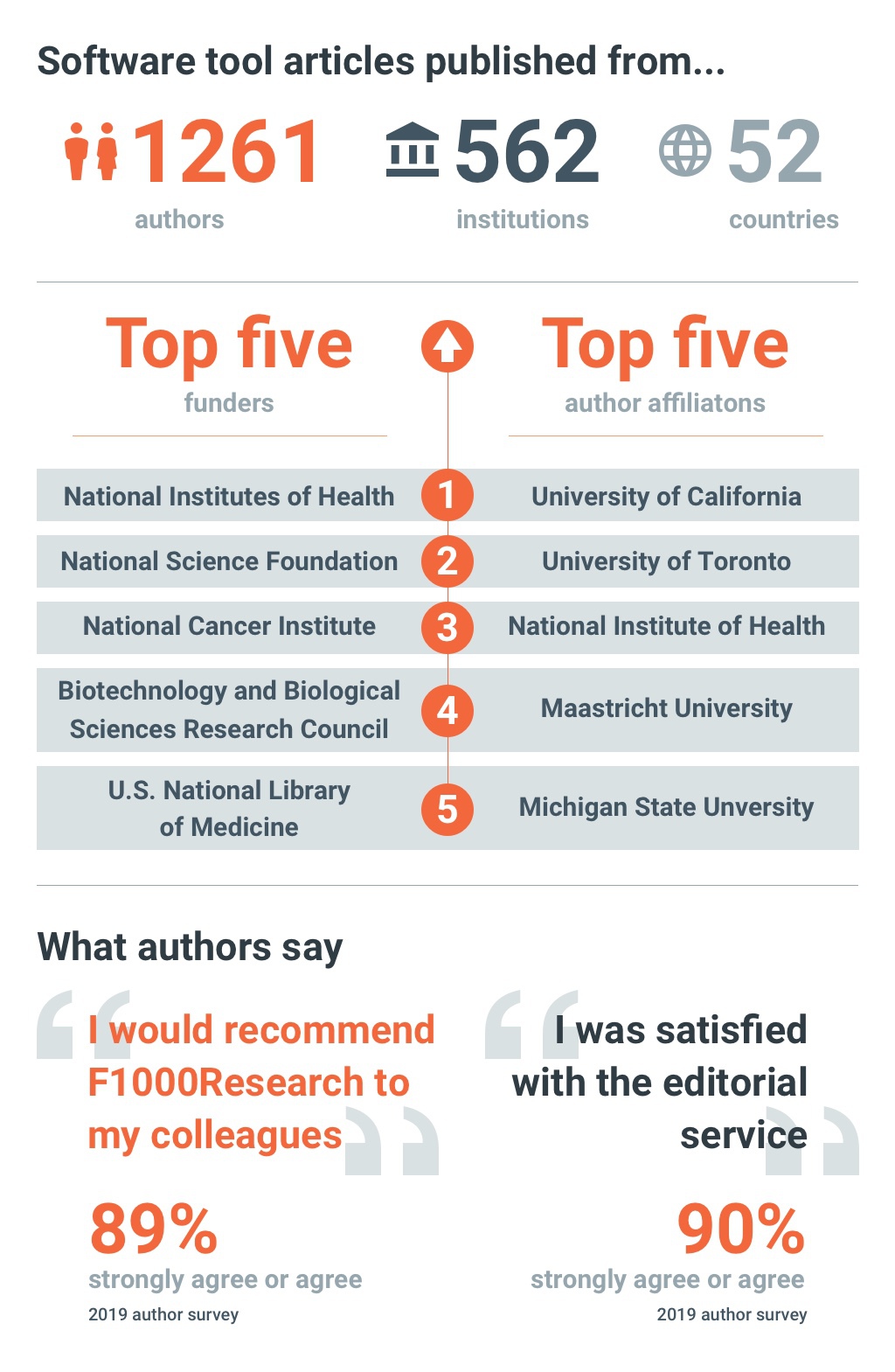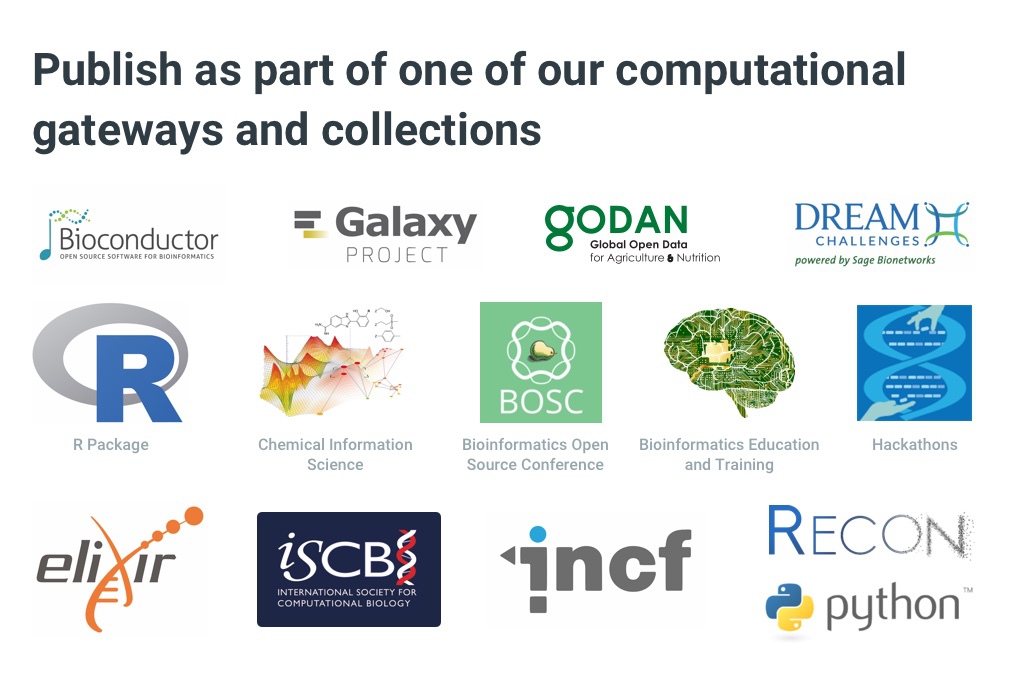Publish your software tool article with F1000Research
Rapid, open publication to help you get the credit you deserve
Submit nowAlgorithms, code, and software tools are crucial to the discovery process in every field of research, from bioinformatics to digital humanities. At F1000Research, we believe that the researchers and software engineers who develop these tools should receive full credit for their work. We also believe that this work should be recognized as part of their research productivity and rewarded as much as traditional research papers. This is where publishing your software tool article comes in.
Software tool articles on F1000Research allow you to describe new software you have created to support or conduct research in any field. These articles explore:
- Why you developed the software
- Details of the code, method, and analysis used
- Examples of data input sets
- Examples of outputs, and how to interpret these
- Tips on how to maximize the tool’s potential
We also welcome articles describing tools created from existing software, web tools, apps, containers, packages, and workflows.
Want to know more? This page is packed with information about software tool articles, and you can keep reading on the F1000Research blog.
Instructions for authors
Ready to submit your software tool article? Take a look at our article guidelines to ensure you've prepared your article correctly.
Read nowResearch Software Publishing: Challenges & Opportunities
In this presentation Vicky Hellon, Associate Publisher at F1000Research, explores how Software Tool Articles can support research software engineers, including:
- What challenges face software developers working in research?
- What does the future of software publishing look like?
- What are Software Tool Articles on F1000Research?
About F1000Research
F1000Research is a fully open access publishing platform, offering rapid publication of articles and other research outputs without editorial bias. All articles benefit from transparent post-publication peer review, and editorial guidance on making source data openly available.
F1000Research advocates for transparency and reproducibility in research, and our unique publishing model supports this at every stage. Articles can be published in as few as 14 days, with post-publication peer review creating an open dialogue between authors and their research community. This generates feedback which can be used to improve the article and develop the author's skills.
Our data and software sharing policy is designed to ensure that research is reproducible. For software tool articles this means the tools themselves should be openly accessible and clearly linked to any appropriate data and results.
Join our mailing list
Be the first to know about special offers, calls for papers, and more. Sign up to our mailing list today.
Sign up nowWhy publish your software tool article on F1000Research?
Full credit
Receive full credit and recognition for your work by publishing your software tool article as a separate citable item.
Interactive figures
Bring your data to life with interactive figures in the body of your article, powered by Plot.ly or via an iFrame. Interactive figures can help tell the story of your research by allowing readers to play with different visualizations, zoom in, filter results, and explore the data in detail for themselves.
LaTex authors
LaTex authors can submit through the F1000Research Overleaf template.
Code Ocean
Embed Code Ocean capsules for in-article code integration and reanalysis. Code Ocean makes it quick and easy for others to re-run your analysis, and even edit your code to see how results differ by changing parameters. Code Ocean supports the reproducibility of science without users needing to install anything on their computer – it all happens within the article. We spoke to Code Ocean CEO, Simon Adar, about how compute capsules support computational reproducibility - read the full interview here.
Code syntax highlighting
Benefit from proper support for code syntax highlighting, so that your code is fully readable in the body of your article.
Indexing
Increase the visibility, reach and impact of your research and software through indexing in Scopus and PubMed.
Versioning
Keep your software tool article up to date by easily publishing new versions whenever you need to share the latest developments in your work. Versions are all individually citable and clearly linked, making it easy for readers to navigate and cite the version they want.
Are you an ISCB member?
Publish your software tool article in the ISCB Community Journal today.
Submit nowVisualize omics data on networks with Omics Visualizer, a Cytoscape App
Marc Legeay, Nadezhda T. Doncheva, John H. Morris, Lars Juhl Jensen
In this software tool article, the authors present a new Cytoscape app, Omics Vizualiser, which can be used to analyse and visualize biological networks.
Omics Visualizer builds upon the enhancedGraphics app, integrates with the stringApp, and supports Cytoscape Automation to facilitate integration with other tools.
Identifying orthologs with OMA: A primer
Monique Zahn-Zabal, Christophe Dessimoz, Natasha M. Glover
This article describes the Orthologous Matrix (OMA), a widely used method and database which allows users to identify orthologs among many genomes. The OMA browser can be used to find genes and different types of orthologs for a gene, such as pairwise orthologs, OMA Groups, and HOGs.
An OMA collection will be launching shortly on F1000Research, to showcase associated papers.
epiflows: an R package for risk assessment of travel-related spread of disease
Paula Moraga et al.
As international travel increases globally, new software tools are needed for risk assessment of potential disease outbreaks in different locations.
This article presents epiflows, an R package which produces estimates for the expected numbers of infections which could be introduced to other locations from the source of the infection.
A step-by-step workflow for low-level analysis of single-cell RNA-seq data with Bioconductor
Aaron T. L. Lun, David J. McCarthy, John C. Marioni
This article describes a computational workflow for low-level analyses of scRNA-seq data, based primarily on software packages from the open-source Bioconductor project.
It covers basic steps including quality control, data exploration and normalization, as well as more complex procedures such as cell cycle phase assignment, and identification of highly variable and correlated genes.
Software Tools | Frequently Asked Questions
Got a question about publishing your software tool article on F1000Research? We've got you covered.
What is a software tool article?
It’s an article describing a novel software tool which has been developed for research, for example an algorithm, code, container, docker, web-app or workflow. Software tool articles explain the rationale for the tool’s development, details of the code used to build it, examples of suitable input data sets, and examples of the outputs from the tool (and how to interpret these).
What if I didn’t create the original software?
That’s fine! We also welcome articles which describe tools created from existing software, web tools, apps, containers, packages, and workflows.
How do I write a software tool article?
See our Instructions for Authors for specific guidance on what to include in your article.
How much does it cost to publish a Software Tool Article on F1000Research?
F1000Research charges an Article Processing Charge (APC) for all articles. You can find out more about these costs here.
Why are software tools a separate article type from traditional research articles?
F1000Research publish a range of article types, allowing researchers credit for all their different research outputs. Software tools are often included as a footnote, or part of the methods section of a traditional research article, so offering software tools as a separate article type allows the software engineer to get sufficient credit for their work. It also provides space to describe the software tool fully (with no word limits) and increases the discoverability of the software itself. Software tool articles can be cited in the methods section of ‘traditional’ research articles.
Do I need to make the source code open if I’m publishing on F1000Research?
Yes. We require a software availability section to be completed in the manuscript. GitHub links are accepted however we also require a permanent archived version, stored somewhere like Zenodo. You can find out more about how software fits into our Open Data Policy in our brand new resource hub, Understanding Open Data.
Do you publish tools that use proprietary software?
Software used as part of an article must be open access or an open access alternative must be provided. Additionally, code used or created must be compatible with an open-source programming language or an open alternative provided. If the article does not meet this criteria, it may be rejected at the discretion of the F1000Research editorial team.
Do you accept tex files?
Unfortunately not, however you can submit via our Overleaf template. We will do any pre-publication check edits in Overleaf and return to you where you can address any changes there.
Do you support Jupyter notebooks?
Unfortunately we do not currently support Jupyter notebooks, however we can host these through an iFrame.
I have a question which isn’t answered here – how do I get in touch?
Drop us an email on research@f1000.com and someone will get back to you. There's also an FAQ page on our website which might answer your question.
Gateways & Collections on F1000Research
Perfect for software publishing
Increase the visibility and reach of your work by publishing your Software Tool Article in one of the relevant Gateways or Collections on F1000Research.
These pages curate research outputs thematically, and offer dedicated publishing portals for different research communities.
Explore the different Gateways & Collections we offer, or keep reading to see what’s newly launched, and what call for papers campaigns are currently live.
Introducing our latest Collections
CABANA: Computational Biology Resources for and from Latin America
The CABANA Project works to improve bioinformatics research and training across Latin America, addressing three major challenges:
- Management of communicable disease
- Protection of biodiversity
- Improving food security
This Collection launched on F1000Research in June 2020, as a place to gather research outputs generated by multiple CABANA activities including tutorials and training resources, slides, conference posters, and articles exploring the science behind the project.
This Collection provides tutorials and protocols on how to leverage the tools provided by OMA, the Orthologous Matrix, a method and database for the inference of orthologs among complete genomes.
Also welcome in this Collection are biological applications, commentaries, conference posters and slides, and any other published work that uses OMA.
Current calls for papers
Did you attend BioC 2020? As in previous years, conference attendees are invited to contribute their research on Bioconductor workflows or packages to the Bioconductor Gateway. Posters from the 2020 conference are also welcome on the Gateway.
Chemical Information Science and Python
We are inviting article contributions to the CIS Gateway and Python Collection. We’re welcoming any submissions around Python software related to chemoinformatics, big data analysis, and AI. This is a great opportunity to increase the visibility of your work by publishing in both the CIS gateway and the Python Collection.
A conversation with Code Ocean
We spoke to Simon Adar, CEO of Code Ocean, about computational reproducibility, and the future of code in research. Read the full interview on the blog.
Read nowShining a spotlight on research software
Vicky Hellon introduces the call for papers, and explores the benefits for researchers who publish a software tool article on F1000Research.
Read nowDeveloping new biomedical software?
This post runs through the key points to consider when it comes to software development, from documentation to licensing.
Read now





